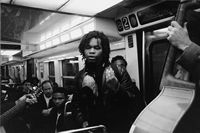
|
 |
The
Underground Orchestra
Het Ondergronds Orkest
|
THE
NETHERLANDS / 1997 / French, Rumanian,Spanish / Color / 35mm(1:1.66)
/ 115min
Director: Heddy Honigmann
Script: Heddy Honigmann, Nosh van der Lely
Photography: Eric Guichard
Editing: Mario Steenbergen
Sound: Piotr van Dijk
Producer: Pieter van Huystee
co-producer: VPRO Televisie
Production Company, Source: Pieter van Huystee Film & TV
World Sales: Fortuna Films
Prinsengracht 634, NL-1017 KT Amsterdam
THE NETHERLANDS
Phone: 31-20-6258871 / Fax: 31-20-6380149
 |
|
Heddy Honigmann
Born in 1951 in Lima, Peru. Went to Holland and subsequently became
a Dutch citizen in 1978. Studied biology and literatrue in Lima and
film in Italy. Her first film, The Israel of of the Beduins
(1979) was co-directed with C. Carlotto. She has also made The
Front Door (1985), Mindshadows (1987), Your Opinion
Please (1989), Four Times My Heart (1990), and Stories
I Tell Myself (1991). Her Metal and Melancholy (1993) received
The Mayor's Prize at YIDFF '95. Her most recent works include Goodbye
(1995), O Amor Natural (1996), and 2 Minutes Silence, Please
(1998).
|
In the tunnels of the Paris Metro and on streetcorners, a variety
of musicians play their instruments in order to feed themselves. This
is a familiar scene in any city, but behind the music is the reality
that many of these people are political exiles and illegal immigrants.
Heddy Honigman, who in Metal and Melancholy (1993), exhibited
at YIDFF '95, turned her camera on taxi drivers in Lima, Peru and
captured people living hard lives in Latin America, here imprints
freshly into the screen the musical performances, lives and words
of these survivors in a foreign land. The splendor of the music touches
all genres, from classical and chanson to R&B and world music,
while the musicians tell of their hard pasts and far-from-easy present
lives. Honigman's penetrating eye overflows with warm sympathy, but
the images maintain a light style and do not slip easily into sentiment.
A paean to humanity for the eyes and ears, this is the director's
finest work.[Inada Takaki]
Director's
Statement
Mrs. Hanh Truong from Vietnam sings in her small home in Paris, "A
houseboat, flowing water splitting in two. Those who want to return
to the highlands do so." The last notes of the song resound as
we see a different picture, of Mario, the harpist from Venezuela,
who is tensely and intently making a phone call about the forlorn
prospect of a new house for him and his family. It is as if Mrs. Truong
is encouraging him a little with her music, in the sense of "Boy,
don't let them get you, just go back to your country if it doesn't
work out here." And it is also as if she is singing for En and
his brother from Bosnia. But Mario and En and the others cannot just
go back.
Throughout The Underground Orchestra, people tell their stories
from the heart. The film is a musical journey through a world at war,
a trip through the world of exile.
The film was to have been set largely under the ground. We were to
encounter musicians from all over the world in the corridors and moving
carriages of the Paris Metro. But we were never given permission to
film in the Metro. So we filmed clandestinely and found ourselves
banished above ground. But the underground feeling also penetrates
above ground.
Our musicians are aliens: their music, their memories, backgrounds,
languages and stories take us elsewhere. In each of their cases, something
went wrong, a long time ago or a short time, or something is still
wrong. A war, a military coup, an ideology that has been overthrown,
a rate of inflation too high, poverty or starvation. In this film
we encounter a large part of the history of the world in the last
twenty years. A history of exile, resistance, loneliness and hope.
All of this resounds in The Underground Orchestra.
|
  |
|
before
|
COPYRIGHT:Yamagata International Documentary Film Festival Organizing Committee |